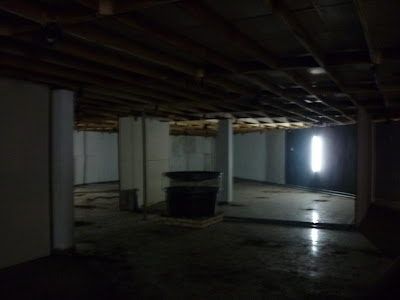So our friend Raymond took us to his bird house in Air Putih here in Kuantan on Sunday afternoon. I have heard of bird houses before but as yet have never had the pleasure of entering one. Apparently they are dark and smelly and very, very loud. I read an article in the newspaper last year about the uproar that has resulted in a bird house in Melaka. The owners of nearby shops and houses were complaining heavily over the noise being emitted from the bird house. It had become a nuisance indeed.
However, as we sat comfortably in the car on the way to Raymond's bird house here in Kuantan, I was excited as you always are when doing something for the first time. The sense of exploration is a great asset we as humans have. Raymond's bird house is located above a shop. You would never have guessed it was a bird house from the outside:
Not a sound, or a bird, in sight!
Raymond unlocked a door which led up a dirty flight of stairs to another locked door. A small device sat on a shelf by one wall:
The volume controls.
Speakers in the bird house above are connected to this machine which blast out the noise of birds chirping, to attract swiftlets to the den. Yes, the birds in mention here are swiftlets. Swiftlets are attracted to the bird house by the shrill sound of their call being blared out into the skies by these machines. There is one just down the road from our house. No matter what time of the day I could always hear the loud singing of birds - then Raymond informed me on what it really was.
The final set of stairs leading to the top floor were pitch black as Abigail, our other friend, closed the other door shut. And then we heard it - the swiftlet caller's sound started out faint and distant, but as we entered the cavern above it was much louder than I had ever imagined it would be, a piercing din which rebounded constantly off my eardrums.
The actual bird house was dark apart from one light against the back wall which illuminated silhouettes of the swiftlets as they randomly flew around our heads amidst the deafening song of the bird. Raymond just walked further in to the place, seemingly oblivious of the low-flying swiftlets. I followed suit, not worrying anymore about what would happen should a swiftlet crash right into my face!
He pointed out the work of the swiftlets in his house. A great wooden grid lies on the ceiling and this is where the work is done. When birds find a partner for mating, they begin work on an amazing nest on the wooden grid, made entirely from their saliva.
These swiftlets are busy building their own nests from their own saliva so that they can have their own offspring together. Strands of their gummy saliva hardens when in contact with air, forming these nests which the Chinese love to consume in Birds Nest Soup. When the nest is finished, it will be removed, cleaned and sold to restaurants or international traders doing business with clients from mainland China.
A single gap in the roof allows the swiftlet call to be sent out, and brings the swiftlets in, in the allure of finding a mate. While we were there we noticed a small swiftlet struggling on the floor. Raymond explained to us that it had probably fallen out of its nest and probably doesn't yet know how to fly. If we were to touch it in an attempt to help, the mother would immediately disregard it as she sensed it had been in contact with a human. So we had to leave the baby bird on the floor, hoping its mother would soon discover it.
The temperature and air humidity must be monitored closely to maximise the breeding swiftlets in the bird house, resulting in an increased quantity of nests to sell.
It was an interesting experience and I was able to learn knowledge that I hadn't known beforehand. People make a lot of money out of bird houses and swiftlet farming, and it is an intriguing process indeed.
As we left the den upstairs we descended once more into the darkened staircase, glad to see the daylight spilling through the door at the bottom of the stairs. The shrill screaming sound of the swiftlet caller disappeared and we walked back out into the hot Malaysian sun where not a sound was heard on this beautiful Sunday afternoon.





















































